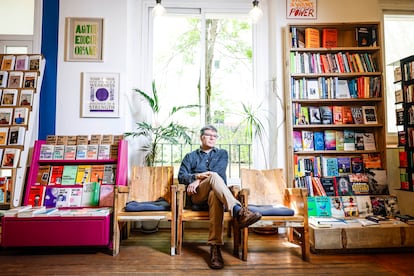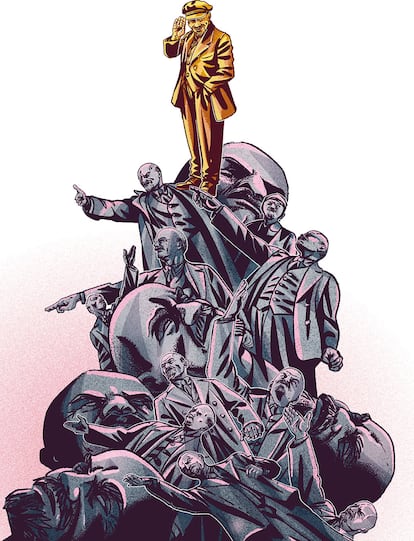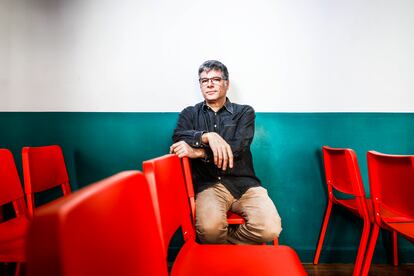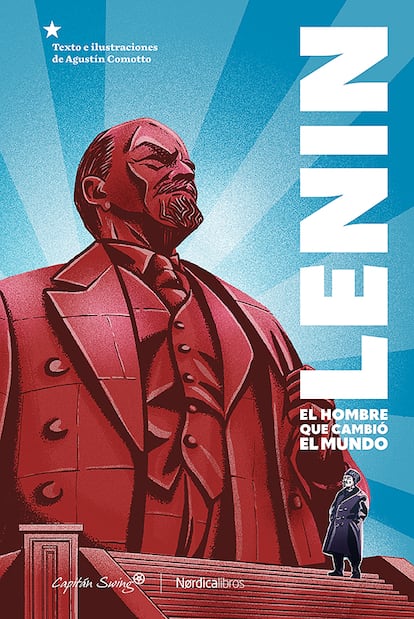Agustín Comotto, author of graphic novel on the founder of the Soviet Union: ‘Lenin would now be on TikTok’
The Argentinian cartoonist has published a carefully illustrated biography of the Soviet leader on the centenary of his death

The history of Russia in the 19th and 20th centuries fascinates Buenos Aires-born illustrator Agustín Comotto. The 56-year-old’s passion was well known in the publishing house Nórdica, which has published his other works, such as Stein and 155. Simón Radowitzky. And so the graphic novel Lenin. El hombre que cambió el mundo (Lenin: The Man Who Changed the World), was co-published with Captain Swing a few months ago, marking the centenary of the death of the architect of the Soviet Union. “They asked me for a publication that would interest those who don’t know about him, but also those who do,” he explains from the Traficantes de Sueños bookstore, during a visit to Madrid.
“My father was a Marxist-Leninist, a militant. I was not,” he explains. “The Russian Revolution was a demonstration, the people’s vomit, which was later transformed into what became the USSR. That original revolution was not Bolshevik, many anarchist movements participated. I feel much more sympathetic to that current.”
Question. What have you discovered about Vladimir Ilyich Ulyanov?
Answer. He did not smoke. He was a deeply neurotic, dexterous man and he possessed an impressive intellectual capacity. To give an opinion about Lenin, I think you would have to understand Russian, as almost all the references we have about him are biased — they are either from Western historians or from Soviet translations. After his death, Stalin created the myth. Fortunately, archives have been opened in Russia, in which there is a lot of Lenin’s correspondence. These letters suggest a very different figure from the one constructed after his death.
Q. Was the adaptation difficult?
A. Lenin lasted 53 years. He spent about 17 years in exile. He died of cerebral thrombosis, just like his father. Although he is a character that fascinates me and that I have researched, it has been an arduous task of synthesis. He produced an awful lot for such a short life. He slept very little and had two drugs: work — he spent more than 10 hours a day reading and writing — and power.

Q. You claim that his main aim was the ascent to power.
A. Lenin knew that power could be acquired; the difficult thing was keeping it. He had no particular talent. He was not a magnetic person or a great writer or orator but he knew how to read the masses — something that today is worth its weight in gold. On a political level, his master stroke was the taking of the October Palace.
Q. Why?
A. He wants power. It’s not in the bag and he’s working against the clock. The real coup was at the Soviet Congress, when the wealth of the Soviets became a Bolshevik triumph; a radical collective that had been a historic minority. Lenin takes control and begins to draw up a diagram of the Soviet State, with fascinating characteristics. For example, the idea that the future is ahead of us, and that we must always move in that direction. There is a kind of secular religion about all this.
Q. Is there a contemporary aspiration for the future?
A. The current aspiration is based on maximizing individualism; optimism is associated with the possibility of having a slightly higher salary to buy a new smartphone. We live in an ultra-capitalist society, where no one considers a collective life. We are unconscious. Lenin’s idea was the opposite.
Q. Do you think a new social class is emerging?
A. I’d say a new paradigm is emerging: What do we do? Under capitalism, people have to work, to produce. However, humanity now faces two great challenges. On the one hand, collapse: we are moving at a relentless pace into a wall that is the Earth and its limited resources. On the other, technology. And I refer to the speech [of the anarchist intellectual Piotr] Kropotkin, when he spoke about the moment humanity would develop a technology that would lead to reassessing the meaning of work.

Q. Meanwhile, social networks are making us reconsider the meaning of truth.
A. They are an artifact. They promised to unite people and it turns out that we have never been more alone. Do people think that followers are friends? On the networks different realities are created and everyone is in their own bubble. When a sense of reality is lost, social control becomes easier. That’s why the far right is in full swing on TikTok. They have realized that by putting into practice a series of maneuvers, they win elections: they started with Bolsonaro [in Brazil] and continued with Argentina. There are professionals working to brainwash people and manipulate them.
Q. What social platform would Lenin be on?
A. TikTok. And he would be doing very well. He would use all the technological means at his disposal. That’s what he did at the time with photography and cinema while also starting his own media; with the films October: 10 Days that Shook the World or Battleship Potemkin, stories were created. On the other hand, he applied any strategy he could think up to knock down the adversary, even breaking codes. When he called an opponent vermin or a stinking rat, he did it not to insult them, but to get them out of the box. That strategy resembles the one used by Trump, who is a master at this. Contemporary politics also works with spin doctors such as Steve Bannon. Lenin was a forerunner regarding many of these strategies.
Q. Why does Lenin continue to generate such feeling?
A. The first person to start the hate narrative on Lenin was Churchill. He said to the Germans, “You have created the machine that is going to destroy you utterly.” He said this during World War I, when Germany was financing Tsarist dissidence, to try to collapse the empire and get control of that front. They gave a lot of money to the Bolshevik cause, because it was the most radical. Churchill warned them that if these people ever came to power; they would challenge capitalism, not the Germans or the English, but the whole world. Lenin was the first to create this kind of monster that could destroy everything that ‘good’ men believed in. Basically, the Cold War was based on that discourse. This tactic endures: today, there are people and politicians who describe any idea that goes against their own as communism, Leninism, Stalinism or anti-Semitism.

Sign up for our weekly newsletter to get more English-language news coverage from EL PAÍS USA Edition
Tu suscripción se está usando en otro dispositivo
¿Quieres añadir otro usuario a tu suscripción?
Si continúas leyendo en este dispositivo, no se podrá leer en el otro.
FlechaTu suscripción se está usando en otro dispositivo y solo puedes acceder a EL PAÍS desde un dispositivo a la vez.
Si quieres compartir tu cuenta, cambia tu suscripción a la modalidad Premium, así podrás añadir otro usuario. Cada uno accederá con su propia cuenta de email, lo que os permitirá personalizar vuestra experiencia en EL PAÍS.
¿Tienes una suscripción de empresa? Accede aquí para contratar más cuentas.
En el caso de no saber quién está usando tu cuenta, te recomendamos cambiar tu contraseña aquí.
Si decides continuar compartiendo tu cuenta, este mensaje se mostrará en tu dispositivo y en el de la otra persona que está usando tu cuenta de forma indefinida, afectando a tu experiencia de lectura. Puedes consultar aquí los términos y condiciones de la suscripción digital.









































